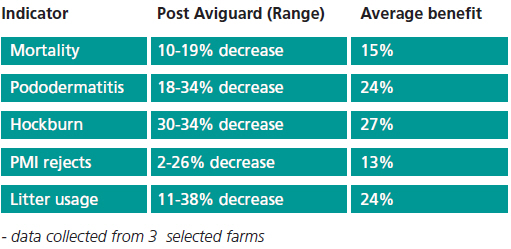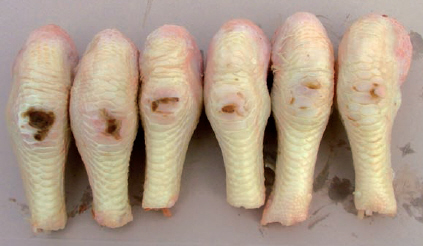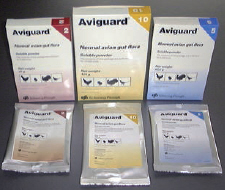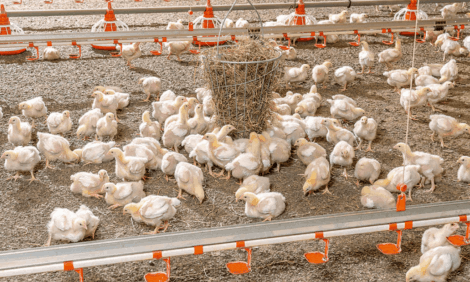



From Competitive Exclusion to Competitive Advantage
In the battle to manage bacterial enteric disease in broiler operations, producers in the UK have a range of options at their disposal, says MSD Animal Health in the UK.Discussion of the 'Seed, Feed and Weed' strategy is growing, as producers seek to control antibiotic use, and the competitive exclusion product, Aviguard, can form an ideal part of such an approach.
The degree to which broiler performance is impacted by pathogenic bacterial challenge varies from unit to unit. In many cases, it is an historical burden that requires treatment with antibiotics cycle after cycle. But if enteritis consistently takes 20 to 30 points off FCR and there are further losses due to increased labour costs, litter management and downgrades, the need to revisit and reassess the strategy for enteric health becomes a necessity.
Competitive Exclusion
Aviguard works through a process known as ‘competitive exclusion’ and whilst this concept is not new, the science behind the process has progressed significantly. Competitive exclusion works by introducing beneficial bacteria into the gut of the chicken at such a level that the more harmful bacteria are denied the environment they need in order to survive and multiply.
There are over 200 species of bacteria within Aviguard; all are derived from normal healthy chickens. These beneficial bacteria colonise the intestine and thereby prevent future pathogenic bacteria from becoming established. This is in contrast to probiotic preparations which do not colonise and remain in the gut.
Recent research by Dr Margie Lee, a distinguished veterinarian of The University of Georgia, indicates that complex interactions involving cell signalling and genes being switched on and off take place between intestinal bacteria, their host, and potential pathogens, when such a large community is present and that if enough “good” bacteria are present, other bacteria may not get a chance to be “bad”.
Overgrowth of Clostridium perfringens and release of toxins is known to play a key role in the spectrum of conditions that ranges from dysbacteriosis to necrotic enteritis. Competitive exclusion through Aviguard has been recorded as being effective in reducing the impact of clostridial challenge to a manageable level. Aviguard has been shown to be as effective as some antibiotics in preventing C. perfringens from establishing in the gut.
In 2009, MSD published data confirming that on farms where Aviguard had been introduced the use of antibiotics had declined. More recently, the company closely monitored performance over several crops on three further selected broiler farms with history of enteric problems. In each case, they sought to record performance relative to a period before Aviguard was introduced. In total, they analysed data of 2.25 million birds pre-Aviguard with 2.25 million birds on Aviguard.
The feedback from the units shares several common features and reinforces the progress each unit has made addressing their specific issues.
Performance Advantage
In each instance, there was a marked improvement in bird performance (mortality) as well as improvements in factors relating to bird quality and welfare (hockburn, pododermatitis, PMI rejects) and economics (litter and associated labour costs reduced).
Using the information provided, MSD has been provided with we are able to assess the improvements after using Aviguard for five cycles relative to pre-Aviguard use.

The advantages confirmed here would provide significant margin improvement if applied to a majority of UK broiler operations. Savings in antibiotic medication and shavings alone show a benefit of 1.3p from of using Aviguard. This figure does not include saved costs in labour or gas that may have had to be used before Aviguard to help keep litter dry.
Legislative Pressure
Pododermatitis and hockburn are generally held to be related to wet litter and enteric challenge. European legislation may result in producers being required to significantly down stock by up to 6kg per square metre if it is identified that high levels of pododermatitis and/or hockburn are being recorded over time in birds from particular units.
.jpg)

So what is the producer to do when costs are rising and returns are still very low? Every broiler unit has an individual health profile and those with problems may experience a range of margin-draining enteric challenges.

Veterinary advice should be sought for the use of antibiotics to treat birds when it appears to be necessary. Where MSD has had the opportunity to work closely with producers and their vets in introducing Aviguard to the unit, marked improvements in enteric health have been seen.
Producers have also been able to greatly reduce or eliminate the need for antibiotics. Discontinuing any medication is, of course, a big step and in each case the vet must be confident that the new option is sustainable.
Aviguard is not a panacea for all enteric problems is poultry but can be an essential part of the recently introduced 'Seed, Feed and Weed' strategy.
Producers in the UK who would like to discuss the possibilities of including an Aviguard programme can contact MSD Animal Health on 0370 0603380.
December 2013












